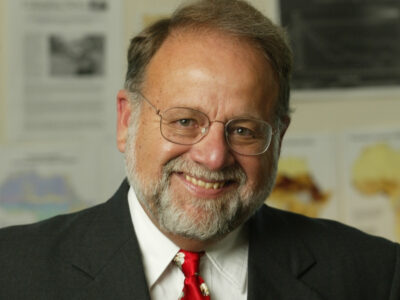The Earth Institute at Columbia University is pleased to announce the 2007-2008 Marie Tharp Fellows — four women who are making noteworthy contributions to the study of the natural world.
The 2007-2008 Marie Tharp Fellows are: Susan Capalbo, Director of the Big Sky Regional Partnership and Professor of Agricultural Economics, Montana State University; Sonya Dyhrman, Assistant Scientist, Woods Hole Oceanographic Institution; Barbara John, Professor of Geology and Geophysics, University of Wyoming; and Kathleen Weathers, Senior Scientist, Institute of Ecosystem Studies.
Each of the Marie Tharp Fellows will spend three months working at the Earth Institute and will receive $30,000 to support their project. Launched in 2004, the Fellowship is named after Marie Tharp, a former Columbia University scientist who left an indelible mark on the study of oceanography by being the first to map the ocean floor on a global scale. Tharp, who joined the University in 1948, published the pivotal interpretations of mid-ocean ridges that led to the eventual acceptance of the theories of plate tectonics and continental drift.
The Marie Tharp Fellowship is sponsored by the Earth Institute ADVANCE Program, a program funded by the National Science Foundation. The mission of ADVANCE is to increase the recruitment, retention and advancement of women scientists and engineers at Columbia University. The Fellowship is open to emerging and established women scholars whose research covers one or more of the core scientific fields in the Earth Institute, including the Earth sciences, engineering, the social sciences, and the environmental health sciences.
More about the 2007-2008 Marie Tharp Fellows:
Susan Capalbo, Director of the Big Sky Regional Partnership and Professor of Agricultural Economics, Montana State University
Cabalpo will be working with the Lenfest Center for Sustainable Energy to systematically address potential regulatory and economic roadblocks for the early commercialization of carbon capture and storage technologies. She has been involved in the economics of climate change, carbon sequestration, and integrated policy analysis for the past ten years. She has been the Director of the Big Sky Carbon Sequestration Partnership since its inception in 2003, and works closely with the Montana Governor’s Office as a member of his Science Advisory Panel. She received her Ph.D. in agricultural economics from the University of California-Davis.
Sonya Dyhrman, Assistant Scientist, Woods Hole Oceanographic Institution
Dyhrman studies how marine phytoplankton influence the cycling of organic matter and different biolimiting elements. As a Marie Tharp Fellow, she plans to use her genomics expertise to examine how increases in CO2 influence carbon metabolism and calcification. Dyhrman will be collaborating working with scientists at the Lamont-Doherty Earth Observatory to develop a molecular-approach to assess species-specific grazing rates on harmful algae. She received her Ph.D. in marine biology from the University of California San Diego, Scripps Institution of Oceanography.
Barbara John, Professor of Geology and Geophysics, University of Wyoming
John has devoted much of her career to understanding processes associated with rifting, and crustal extension in particular. She was the first to apply chronometric techniques originally used in continental settings to document the rate of crustal growth, fault slip, and the thermal/mechanical history of oceanic lithosphere. During her fellowship, John will collaborate with scientists from the Lamont-Doherty Earth Observatory on a project that addresses integrated growth, cooling, and deformation of oceanic lithosphere in slow and ultra-slow spreading ridge environments. She received her Ph.D. in geology from the University of California, Santa Barbara.
Kathleen Weathers, Senior Scientist, Institute of Ecosystem Studies
Weathers’ expertise is in the mechanisms through which fog influences ecosystem processes. She has conducted research in diverse coastal and inland ecosystems, including northern hardwood, spruce-fir, and oak forests of eastern North America; coastal and temperate rain forests of Chile and California; and semi-arid ecosystems in South America. During her fellowship, Weathers will be collaborating with researchers in the Department of Ecology, Evolution and Environmental Biology (E3B) and at the Lamont-Doherty Earth Observatory. She received her Ph.D. in ecology from Rutgers University.



